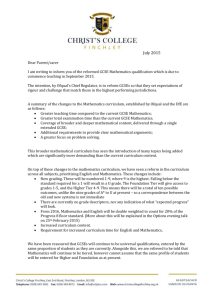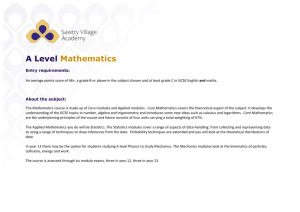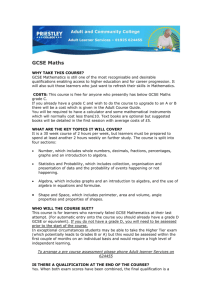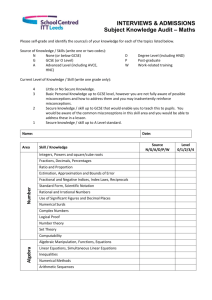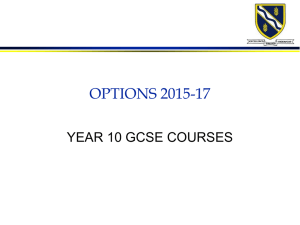Maths and English briefing - The Education and Training Foundation
advertisement
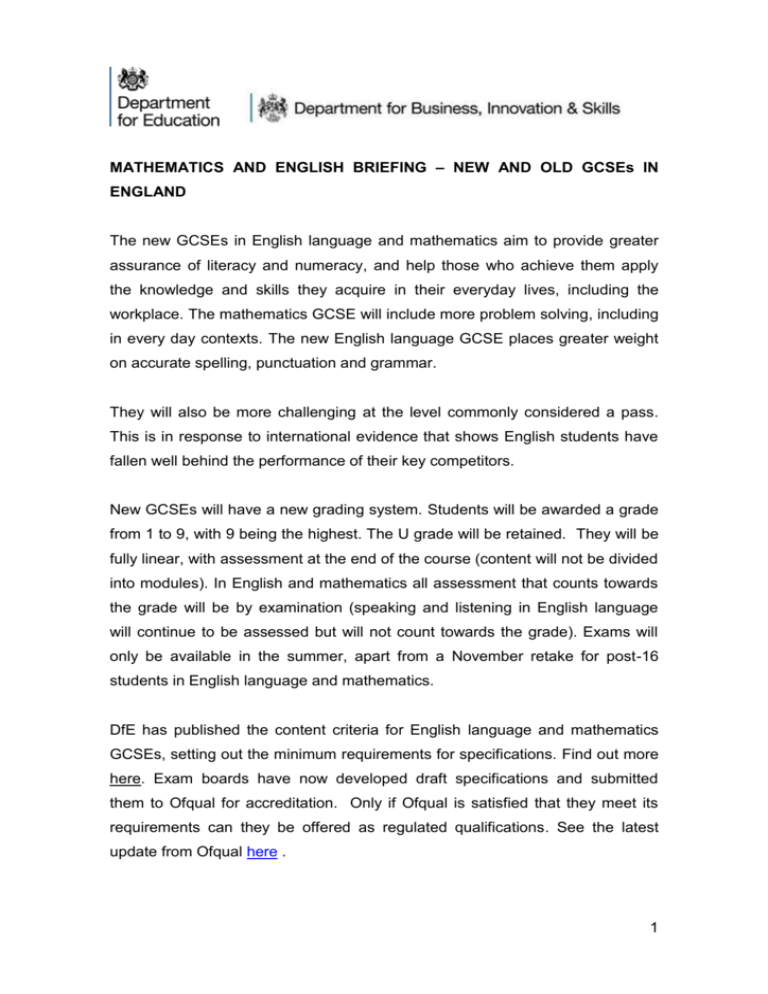
MATHEMATICS AND ENGLISH BRIEFING – NEW AND OLD GCSEs IN ENGLAND The new GCSEs in English language and mathematics aim to provide greater assurance of literacy and numeracy, and help those who achieve them apply the knowledge and skills they acquire in their everyday lives, including the workplace. The mathematics GCSE will include more problem solving, including in every day contexts. The new English language GCSE places greater weight on accurate spelling, punctuation and grammar. They will also be more challenging at the level commonly considered a pass. This is in response to international evidence that shows English students have fallen well behind the performance of their key competitors. New GCSEs will have a new grading system. Students will be awarded a grade from 1 to 9, with 9 being the highest. The U grade will be retained. They will be fully linear, with assessment at the end of the course (content will not be divided into modules). In English and mathematics all assessment that counts towards the grade will be by examination (speaking and listening in English language will continue to be assessed but will not count towards the grade). Exams will only be available in the summer, apart from a November retake for post-16 students in English language and mathematics. DfE has published the content criteria for English language and mathematics GCSEs, setting out the minimum requirements for specifications. Find out more here. Exam boards have now developed draft specifications and submitted them to Ofqual for accreditation. Only if Ofqual is satisfied that they meet its requirements can they be offered as regulated qualifications. See the latest update from Ofqual here . 1 English language content: the new English language GCSE provides greater focus on ensuring students can read fluently; analyse texts and write clearly and accurately using appropriate Standard English. Students will be expected to use a range of vocabulary and different types of sentence structure with accurate spelling and punctuation, which will contribute 20 per cent of new GCSE marks of the overall qualification (up from 12 per cent in the old GCSE). The importance employers place on oral literacy and spoken language will continue to form part of the new English language GCSE but will be reported separately and will not contribute to the final mark and grade. Other new requirements include testing whether students can write in different ways such as narrating and presenting arguments to different audiences. English language GCSEs will examine students on their understanding of texts they have not seen before. These must: include high quality and challenging texts drawn from the 19th, 20th and 21st centuries, which represent a substantial piece of writing, making significant demands on students in terms of content, structure and the quality of language used; and include literature and extended literary non-fiction and other writing such as essays, reviews and journalism (both printed and online) Texts that are not intended to be kept as a record, such as instant news feeds, must not be included. The exam boards have provided exemplar assessment materials along with their draft specifications. Their non-fiction examples include: a 19th century account of slavery, a speech by President Obama on Nelson Mandela, extracts from the Sunday Times and the Observer and a Government recruitment advert for MI6. English language GCSEs will not be tiered so all students will sit the examination papers. Mathematics content: the DfE’s mathematics content requirements for the new GCSEs requires students to demonstrate confidence and competence with mathematical content so that they can apply it flexibly to solve problems. It requires students to be aware that mathematics can be used to develop models 2 of real situations. Essential key stage 3 content has been explicitly included and forms a large part of the content all students should aim to master. Students should develop confidence and competence with key applications of secondary mathematics, such as arithmetic or ratios, before moving on to more advanced mathematics. The requirements cover each of the skills required by current Functional Skills qualifications. Students will need to demonstrate that they can solve problems involving percentage change, including percentage increase/decrease and original value problems, and simple interest such as financial mathematics. The new GCSE will also have a section on ratio, proportion and rates of change. Students will also have to learn about vectors and conditional probability, and a number of key formulae by heart. Mathematics GCSEs will continue to be tiered, with a higher and foundation tier available, overlapping at the mid-point of the grading scale. The weightings for each content domain are different for foundation and higher tier. For foundation tier, content domains which assess students’ confidence in the basics – Number (with explicit reference to formal written methods of calculation) and Ratio, Proportion and Rates of Change (with reference to simple interest in financial mathematics) – have been substantially enhanced and will make up at least half of each paper. There will be more challenging questions for the most able to properly test their understanding of the mathematical knowledge needed for higher level study and careers in mathematics, the sciences and computing. The new mathematics GCSE is larger than the current qualification and the total assessment time will be greater, at a minimum of four and a half hours. We expect that schools and colleges will probably want to increase the time spent teaching mathematics.1 1 On average, schools in England teach mathematics for 116 hours a year. An extra lesson per week would put English secondary schools closer to those in Hong Kong and Singapore, which teach for 138 hours a year on average. 3 Exam boards have taken account of the requirement for pupils to apply their mathematical understanding to real world contexts in their draft assessment materials, for example, through questions that test a pupil’s ability to compare the costs of two of more different transport choices. What evidence is there that employers want students to hold a GCSE? According to an Ofqual survey, 93 per cent of employers say GCSEs are important to obtain but only just over half agree that other qualifications are of equal value. Professor Alison Wolf, author of the report The Review of Vocational education in 2011 that led to the reforms, found: “English and Maths GCSE (A*-C) are of critical importance for employment. Employers use them as a signal and sifting device.” What will be the pass grade in the new GCSEs? Ofqual has consulted on grade standards for reformed GCSEs, which will first be awarded in 2017. This covers all students taking a two year course from September 2015 or a one year course from September 2016. The results of this consultation will inform DfE decisions on how to reflect the new grades in the accountability framework and on English and mathematics requirements for 16-19 study programmes. Employers and further and higher education institutions will want to make their own judgments about how to reflect the new GCSE grades in their entry requirements. Where can I find innovative ways of teaching maths and English GCSE? The Excellence Gateway on the ETF website provides a portal so staff can easily access models of outstanding and innovative practice in the teaching of mathematics, English and SEN to post 16 students. DfE has funded AOC, Gazelle and 157 group initiatives to recognise and promote excellence in the delivery of mathematics and English. 4
